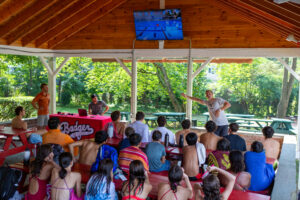A note from Badger Parent Advocate, Mike Conaton:
I recently attended a presentation by Dr. Alex Diaz, a local sports psychology consultant. Dr. Diaz began by explaining the biological development of the human brain which establishes certain innate tendencies. For example, the section of the brain that controls our motor skills, adrenaline and “fight or flight” instincts actually develops before the cognitive section of our brain which enables our ability to think. This was an “A-Ha” moment for me as I could now better understand the origin of the basic concept of “not overthinking things” and just letting your body perform.
We all know many athletes rely on repetition and muscle memory to help achieve optimal performance (think endless practice of attempting free throws, fielding ground balls, swimming stroke technique). Derek Jeter has said he used to try not to think about it, “let the moment come to him”, then rely on his instincts and reaction to take over. NFL quarterbacks can “see” the entire field and check off the various passing routes. We hear of their ability to seemingly “slow the play down” enabling then their athletic talent to execute. Emotion is kept out of the equation. The better players don’t seem to over think or overreact. As Yogi Berra used to ask, “How can you think and hit at the same time?” We can see what happens when this notion is tested – when football coaches try to “ice the kicker” by calling timeouts before a big field goal attempt to make the kicker have to think too much about the magnitude of the moment.
Dr. Diaz spoke to us the same night that Serena Williams was defeated in the semifinals of the US Open by Roberta Vinci. The number one seated and heavily favored Williams had a chance to win the elusive Calendar Grand Slam but was defeated by Vinci in what some called the greatest upset in women’s tennis history. Dr. Diaz described the progression of Williams’ body language and growing emotion that manifested itself in more and more unforced errors as the match went on. She began to talk to herself after points as the pressure of the moment mounted and the magnitude of the Grand Slam prospects seemed to be too much. Dr. Diaz concluded that Williams clearly beat herself, allowing emotion and self-doubt to outweigh and overtake far superior innate athletic abilities.
Dr. Diaz also offered up some great advice for parents of athletes, some of which is included in an article he has written on the subject which can be viewed here.
Earlier in the kids’ athletic careers, it is important to have fun with the sport. To enjoy it as a physical outlet with a social component. Yes it’s not always about winning. When the focus of the activity begins to be based on performance, things can become more complicated…and parents run the risk of exerting too much influence. Imposing their own dreams and experiences on the kids instead of allowing the kid to have their own – making their own mistakes, learning their own lessons, and taking responsibility for themselves and their performance. Dr. Diaz also cautions parents to act as parents, providing support and unconditional love NOT based on this performance.
Above all, parents should acknowledge that they are not the coach. This confuses the kids and potentially causes distraction and poor performance. Dr. Diaz noted the squash players he works with who look back at their parents after every shot. It is dis-functional. He said this is one reason why parents are often asked not to attend practices so that the kids are not distracted or made unnecessarily self-conscious. Let the kids develop their own relationships with their own coaches.
Finally Dr. Diaz spoke about the dreaded “car ride home”. He said studies show that the car ride home from a game/meet or practice is the number one time of stress and anxiety for an athlete with their parents. Just as you or I would not like to talk about our bad day at the dinner table, so too would our kids rather not rehash and relive the errant play or bad swim – especially with their parents who are not their coaches and are supposed to be the kids’ biggest fans and advocates no matter how they performed.
The recurring theme: UNCONDITIONAL love and support…



